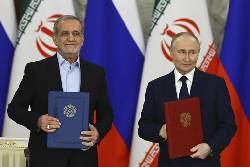MOSCOW (AP) — Russian President Vladimir Putin and his Iranian counterpart, Masoud Pezeshkian, signed a broad cooperation pact Friday as their countries deepened their partnership in the face of stinging Western sanctions.
Russian and Iranian officials say the “comprehensive strategic partnership treaty” covers all areas -– from trade and military cooperation to science, education and culture.
Putin praised the deal as a “real breakthrough, creating conditions for the stable and sustainable development of Russia, Iran and the entire region.”
He said the amount of trade and economic cooperation was still insufficient, voicing hope the new treaty will help clear bureaucratic hurdles and expand ties. The Russian leader added that the countries are trying to resolve technical obstacles to advance planned projects to ship Russian natural gas to Iran and build transport corridors to Iranian ports in the Gulf.
Pezeshkian said the projects are feasible, adding that experts were working to resolve the remaining obstacles.
“We witness a new chapter of strategic relations,” the Iranian president said, adding that the countries were set to expand trade ties and also boost the "level of security cooperation.”
His visit came ahead of Monday's inauguration of President-elect Donald Trump, who has pledged to broker peace in Ukraine and take a tougher stance on Iran, which is grappling with growing economic problems and other challenges, including military setbacks in its sphere of influence across the Middle East.
Kremlin spokesman Dmitry Peskov dismissed any link with Trump’s inauguration, saying the signing had been planned long ago.
The signing of the treaty with Iran follows last year's pact with North Korea -- countries once identified by former President George W. Bush, along with Iraq, as “the Axis of Evil.”
Welcoming Pezeshkian as they sat down for talks, Putin said the new treaty will “give an additional impulse to practically all areas of our cooperation.”
Pezeshkian, who met Putin for the third time since coming to power in July, said the documents form a “solid foundation for our forward movement.”
“We do consider our relations with you as vital, sensitive and strategic, and we are on this path strongly,” he said.
The Iranian president emphasized that countries in the region should resolve their own problems themselves, adding in an apparent reference to the U.S. that the presence of outside forces will only exacerbate tensions and destabilize the situation.
“They come from another side of the world to make chaos in the region," he said. "These ties will defuse their plot, definitely.”
Russia’s ties with Iran have grown closer after Putin sent troops into Ukraine in February 2022. Ukraine and the West have accused Tehran of providing Moscow with hundreds of drones for use to attack Ukraine, which Moscow and Tehran have denied.
Pezeshkian spoke in support of prospective Russia-Ukraine peace talks, saying that “war is not a solution” and urging the West to “avoid imposing excessive demands” and acknowledge others’ “security concerns.”
Last year, Iran joined the BRICS bloc of developing economies and Pezeshkian attended its summit, which was hosted by Russia in Kazan.
Russia and Iran, which had troubled relations in the past, developed cordial ties after the collapse of the Soviet Union in 1991, with Moscow emerging as a key trade partner and supplier of weapons and technologies for Tehran, which has faced bruising international sanctions.
Russia built Iran’s first nuclear plant that was launched in 2013 and is building two more nuclear reactors there.
Russia was part of the 2015 deal between Iran and six nuclear powers offering sanctions relief for Tehran in exchange for curbing its atomic program, and the Kremlin offered political support to Iran when the U.S. unilaterally withdrew from the agreement during Trump’s first term.
Russia and Iran also pooled their efforts to shore up Bashar Assad’s government during Syria’s civil war, but failed to prevent his downfall last month after a lightning offensive by the opposition. Assad and his family fled to Russia.
His ouster dealt another blow to Tehran’s self-described “Axis of Resistance” across the region, which had already been pummeled by Israel’s offensives against two militant groups backed by Iran -– Hamas in Gaza and Hezbollah in Lebanon. Israel also attacked Iran directly on two occasions.
Tehran increasingly needs Moscow’s assistance as it faces economic woes and stinging setbacks across its sphere of influence in the Middle East. The troubles could deepen after Trump returns to the White House with his policy of “maximum pressure” on Iran.
In particular, Iran wants sophisticated Russian weapons like long-range air defense systems and fighter jets to help fend off possible attacks by Israel.
___
Associated Press writer Jon Gambrell in Dubai, United Arab Emirates, and Nasser Karimi in Tehran contributed.
...


 Copyright © 1996 - 2025 CoreComm Internet Services, Inc. All Rights Reserved. | View our
Copyright © 1996 - 2025 CoreComm Internet Services, Inc. All Rights Reserved. | View our